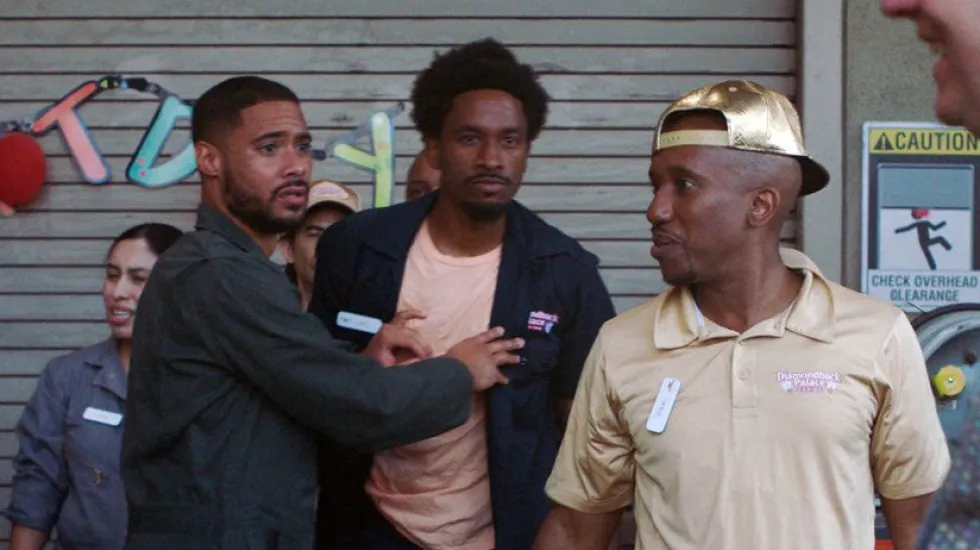
The new Peacock series “Bust Down” is set in the fictional Diamondback Casino in Gary, Indiana, and follows the basic framework of the traditional workplace sitcom a la “Cheers” and “The Office” and “Parks and Recreation” and “Superstore” — but nobody at the Cloud 9 superstore or Dunder-Mifflin would even think about peppering the air with the graphic scatological and sexual references, and certainly not the liberal use of the n-word that permeates every episode of this wild, raunchy, loose, sometimes cringe-worthy but undeniably funny effort.
“Bust Down” is the kind of show that will have some viewers bailing within the first 10 minutes of the premiere episode, while others might be equal parts amazed and delighted by the raw and stripped-down brand of comedy, where virtually nothing is sacred — not homelessness, not sexual harassment, not domestic violence. This is not to say the series makes light of these deadly serious issues; only that humor is mined from some pretty grim situations.
Created by and starring real-life friends Chris Redd, Langston Kerman, Sam Jay and Jak Knight, “Bust Down” doesn’t spend a whole lot of time in the casino itself — though the glimpses we do get of the Diamondback accurately reflect the kind of mildly depressing, claustrophobic, smoke-filled gambling houses found all over America.
A six-episode series available Thursday on Peacock.
Most of the scenes take place either in the casino’s break room or out in the world, as we follow the comic misadventures of Chris (“SNL” cast member Chris Redd), who’s forever talking a big game and clowning around to mask his insecurities; Jak (Jak Knight), who has a sunny disposition even as he seems relatively clueless about life and reluctant to grow up; Langston (Langston Kerman), who speaks in a more sophisticated tone than his friends and considers himself something of a moral conscience for the group, and Sam (Sam Jay), who is in a complicated relationship with her girlfriend and her “side piece,” and seems to be the most grounded and ambitious of the quartet.
The absurd tone of the series is established from the get-go, when a number of male employees come forward after having been harassed and assaulted by their supervisor — and the company’s solution is to have all the male employees escorted to their cars each night. In subsequent episodes, Sam is on the wrong end of a brutal beatdown in a restaurant after she tries to break up with her side girlfriend; Chris starts hooking up with homeless women; Langston has a meltdown at a backyard barbecue when everyone keeps chiding him about being light-skinned, and the group gets high in the car before entering church, where hijinks ensue and f-bombs fly and … we’ll leave it at that.
There’s a lot of pot-smoking and a lot of humor aimed squarely at the crotch and the n-word is thrown around casually in nearly every conversational exchange — but there’s also some biting social commentary, some ridiculously effective over-the-top physical shtick and a steady stream of laugh-out-loud moments. And while these characters initially come across more as caricatures than fully formed sitcom humans, as time goes by, we begin to see flashes of heart and warmth in the crazy free spirits who exist behind all the jokes.







